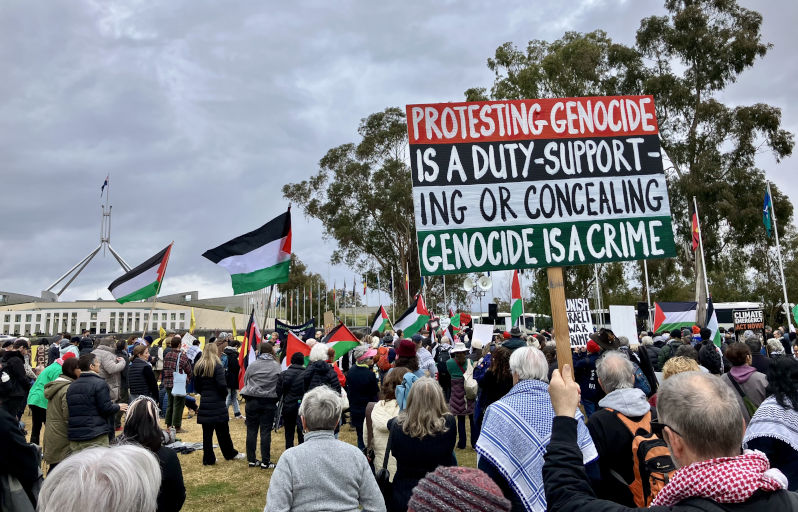Defenders of rules-based order: not who you thought
July 25, 2025
On Tuesday, a committed group of over 1,000 activists rained on the Government’s parade, using the day of the opening of Parliament to protest Australia’s ongoing complicity in the Israeli Government’s genocidal actions in Gaza.
Protesters representing Australians from all walks of life – including more than a few people of the Jewish faith – called on Australia’s government to immediately impose sanctions on the state of Israel for its murderous conduct in the Gaza strip.
The 28-country statement signed by Australia, that was announced a few hours earlier, rightly decried the situation as reprehensible but then stopped short of threatening any sort of consequence should Israel ignored their condemnation, which it promptly did.
Australia continues to refer impotently to international rulings that Israel is clearly not going to acquiesce to.
In the face of this, one must wonder how meaningful Australia’s (and Britain’s, and Europe’s) insistence on the ‘rules-based order’ really is.
It seems that we are all about the rules-based order when it suits our interests but reduced to muted tut-tutting when it doesn’t.
By failing to act in the face of such horrors, Australia, and other Western nations are making a mockery of the international treaty system that we’ve spent 80 years constructing.
It’s refreshing to be reminded that not all governments are so morally bankrupt. Another group of 30 nations have issued their own statement, one that is backed by real measures.
The Hague Group is a self-described bloc of states committed to “coordinated legal and diplomatic measures” in defence of international law and solidarity with the people of Palestine.
Last week, while Australia and other Western nations were wordsmithing our statement of disapproval-without-consequences, Hague Group members committed to prevent the provision of transfer of arms, munitions, military fuel, military equipment and dual-use items to Israel. They also supported universal jurisdiction mandates.
12 states, including our neighbours Indonesia and Malaysia, have committed to implementing the initial six measures immediately.
The group noted that the clock is running down on UNGA resolution A/RES/ES-10/24 that gave states 12 months to take effective action on Israel’s violations of international law, including accountability, sanctions and cessation of support.
UN Special Rapporteur Francesca Albanese commented that the 12 states have taken a momentous step forward and the clock is ticking for other states to join them.
Meanwhile, our ally the United States’s contribution is to impose sanctions on Francesca Albanese herself.
Australia’s lack of backbone on Gaza will have consequences for any future attempts by us and others to claim moral high ground.
Speaking at a webinar organised by the Australian Peace and Security Forum earlier this month, Former UNSC President Kishore Mahubhani commented:
“Post Gaza, no Western mouth should use the word human rights anymore. If you walk into a room of Muslims and tell them that you are defending universal values by defending Gaza, they will look at you and say, ‘Where did this man come from?’ If you really believe in universal human rights, the first people you need to rescue today is to go into Gaza and to save those children, save the mothers, save the families. And if you can’t do that, please shut up on human rights.”
We need to get out of our heads that the idea that the international order is shorthand for the Western-led order. As Hague Group Executive Secretary Garsha Gandikota-Nellutla commented, “For decades, states—particularly in the Global South—have borne the cost of a broken international system. In Bogotá, they came together to reclaim it—not with words, but with actions.”
Times aren’t what they used to be. The leader of the Western bloc is seeking to extricate itself, and its ally Israel, from the international system and the others, Australia included, are not willing to cross them. With a handful of exceptions, the nations that are currently showing themselves to be genuinely committed to an international system aren’t in the West, they are to be found in the majority world. If Australia is going to have any credibility on human rights, or on a rules-based system, we ought to move beyond words and sign on to the Hague Group’s meaningful six-point plan of action and, if our government is disinclined to do so, the question falls back on to us, the people. What are each of us going to do to ensure that we, and our institutions, are not complicit in the Gaza war machine? What can each of us do to make space for conversations that governments – state and federal – won’t create space for? Conversations about how we can be a nation that builds peace instead of a nation that seeks to quietly profit out of war.
The views expressed in this article may or may not reflect those of Pearls and Irritations.

